The Best Magnesium Supplements, According to Dietitians
Dotdash Meredith and Yahoo Inc. may earn commission or revenue on some items through the links below.
Support digestion, help ease headaches, encourage better sleep and more with these trusted magnesium supplement picks

Reviewed by Dietitian Brierley Horton, M.S., RD
Magnesium is a trace mineral that’s essential for good health. It’s involved in the normal functioning of many body systems, including cellular energy production, muscle contraction and relaxation and nerve and heart function. It also plays a role in bone health, mood, blood sugar regulation and sleep.
But here’s the surprising news: “Many Americans don’t get enough magnesium in their diets,” says Lauren Panoff, RD. “Magnesium is found in foods like beans, nuts, seeds, whole grains, yogurt and leafy greens. But if someone doesn’t eat many of these, a supplement can be a convenient way to get most of your RDA (recommended dietary allowance) in a small serving.” The RDA for women is 310 to 320 milligrams a day and for men, it’s 400 to 420 milligrams daily.
Registered Dietitian Ashley Koff agrees. “As a practitioner for over 25 years, I have almost always seen that people are not getting in the RDA [for magnesium],” she says. Besides filling in gaps in diet, there’s evidence magnesium supplements may offer relief from headaches, constipation and stress, as well as support cognitive function and exercise performance.
There’s a lot to consider when you’re shopping for the best magnesium supplement, including what type of magnesium a product contains, how much to take, whether the supplement is third-party testing and what a daily dose costs. To help you decide, we’ve rounded up some of the best magnesium supplements recommended by dietitians and from brands committed to quality.
Deal Alert!
Our best magnesium supplement for travel, Natural Vitality Calm Drink Mix Packets, is on sale at Amazon right now!
Our Recommendations
Best Overall: Pure Encapsulations Magnesium Glycinate
Also Great: Integrative Therapeutics Tri-Magnesium
Best Budget: Life Extension Magnesium Citrate
Best Chewable: SmartyPants Adult Mineral Formula
Best Powder: Thorne Magnesium Bisglycinate
Best for Travel: Natural Vitality Calm Drink Mix Packets
Best for Cognitive Support: Pure Encapsulations CogniMag
Best for Constipation: NOW Magnesium Oxide Pure Powder
Best Overall: Pure Encapsulations Magnesium Glycinate
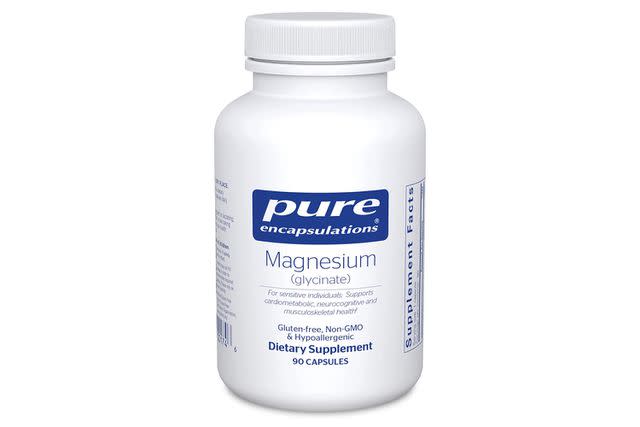
Amazon
What we like: Contains the glycinate form of magnesium, which is easy to absorb and usually well tolerated.
What to know: Each capsule contains 120 milligrams of magnesium, so some may need to take more than one.
A common side effect of taking a magnesium supplement is digestive upset. Some types of magnesium are gentler on digestion than others, including the magnesium glycinate found in this product from Pure Encapsulations. In this type of magnesium, the magnesium is bound to the amino acid glycine, which helps make it easier to absorb.
Researchers have found magnesium supplements may have a calming effect—making it a good choice to support anxiety and stress, and possibly help you unwind in preparation for a good night’s sleep.
Pure Encapsulations offers magnesium glycinate capsules in 90-, 180- and 360-count bottles. Each capsule contains 120 milligrams of magnesium, making it easy to start with a low dose and work your way up as needed or as prescribed by a healthcare provider. Pure Encapsulation products are made in an NSF-registered facility, undergo additional independent third-party testing, are non-GMO and free from major allergens.
Price: $26 | Type of magnesium: Glycinate | Form: Capsule | Magnesium per serving: 120 milligrams (28% DV) | Third-party tested: Yes
Also Great: Integrative Therapeutics Tri-Magnesium
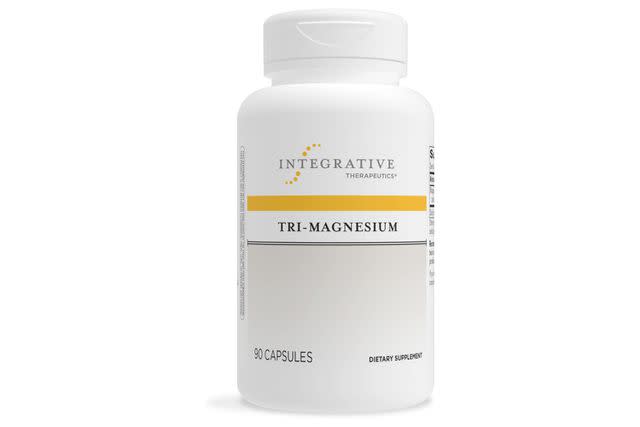
Amazon
What we like: Contains a blend of three forms of magnesium to cover more bases.
What to know: Formulated with magnesium oxide, a form that isn’t well absorbed but can be useful for relieving constipation.
Choosing a magnesium supplement that is made with more than one type of magnesium can enhance absorption and provide numerous benefits. Integrative Therapeutics Tri-Magnesium contains magnesium citrate, malate and oxide. Magnesium citrate is better absorbed than magnesium oxide, but the latter is best for supporting regular bowel movements. If you occasionally deal with constipation, a product that includes the oxide form may help. Both magnesium citrate and malate can be used to boost magnesium levels.
One bottle contains 90 capsules, with each capsule containing 300 milligrams of magnesium. This product is free from gluten and other major allergens. Integrative Therapeutics has been making quality dietary supplements for over 35 years in an NSF-registered facility.
Price: $21 | Type of magnesium: Citrate, Oxide, and Malate | Form: Capsule | Magnesium per serving: 300 milligrams (71% DV) | Third-party tested: Yes
Best Budget: Life Extension Magnesium Citrate
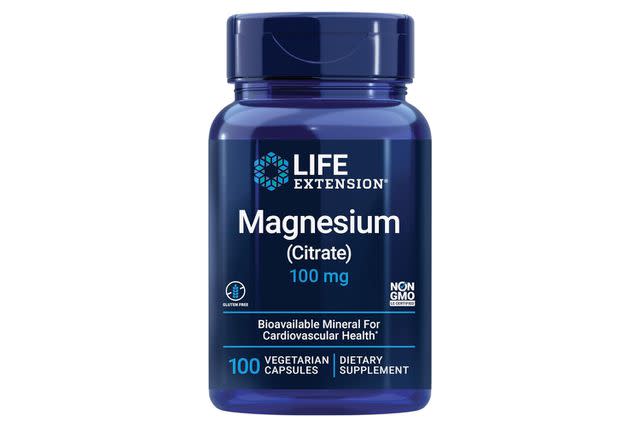
Amazon
What we like: Contains 100 milligrams of magnesium per capsule, which is good for starting with a lower dose.
What to know: The lower dose of magnesium may not be optimal for those with higher needs.
Life Extension’s Magnesium Citrate capsules are worth a look if you want to try taking magnesium without spending a ton. A bottle costs less than $10 and contains 100 capsules and each capsule contains 100 milligrams of magnesium citrate. Many other magnesium supplements contain double or triple this amount, which makes this product a good lower-dose option if you’re just starting out.
Life Extension manufactures its products at an NSF-registered facility. The brand is committed to independent testing for ingredient quality. This product is also non-GMO verified, vegetarian and gluten free.
Price: $10 | Type of magnesium: Citrate | Form: Capsule | Magnesium per serving: 100 milligrams (24% DV) | Third-party tested: Yes
Best Chewable: SmartyPants Adult Mineral Formula
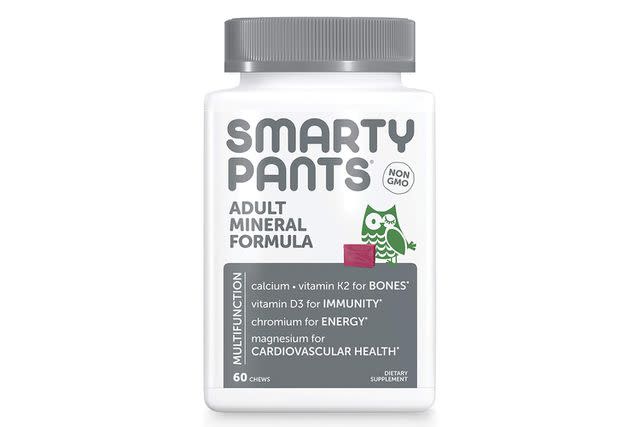
Amazon
What we like: Soft chews are a good alternative to capsules and powders.
What to know: Not strictly a magnesium supplement, as it contains Vitamins C, D, and E, as well as other minerals. One chew also contains 3 grams added sugars.
If capsules and powders aren’t for you, you’ll appreciate the easy-to-chew texture of SmartyPants Adult Mineral Formula. Each bottle contains a one-month supply of individually wrapped soft chews, making it easy to take what you need wherever you go. Each serving delivers 250 milligrams of magnesium citrate.
Not only will you get your daily magnesium fix, this product is also formulated with Vitamins C, D, E and K2 to support immune system function and bone health, plus eight other essential minerals. One thing to know: this supplement contains 3 grams of added sugar per serving, so if you’re limiting added sugar or carbs by choice or necessity, this might not be the best choice.
Price: $19 | Type of magnesium: Citrate | Form: Chewable | Magnesium per serving: 250 milligrams (60% DV) | Third-party tested: Yes
Best Powder: Thorne Magnesium Bisglycinate
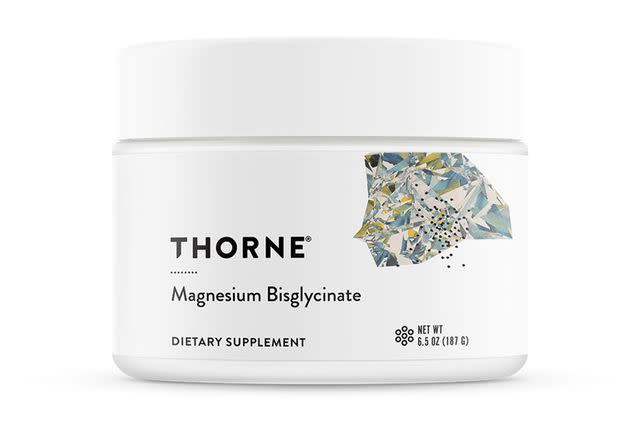
Walmart
What we like: Has been NSF Certified for Sport (a rigorous third-party certification), making it a great option for athletes.
What to know: Costs more than options from other reputable brands.
If quality is a top consideration, you may be familiar with Thorne’s line of dietary supplements. Thorne is committed to developing supplements with ingredients that are backed by research and meet rigorous safety standards. Their Magnesium Bisglycinate powder is NSF Certified for Sport, which means it’s free from over 200 substances banned in the world of sports.
This product contains a highly absorbable form of magnesium similar to magnesium glycinate and is easy to use—just mix one scoop into a glass of water. It’s lightly sweetened with monk fruit concentrate so is free from added sugar, as well as gluten and other allergens.
Price: $48 | Type of magnesium: Bisglycinate | Form: Powder | Magnesium per serving: 200 milligrams (48% DV) | Third-party tested: Yes
Best for Travel: Natural Vitality Calm Drink Mix Packets
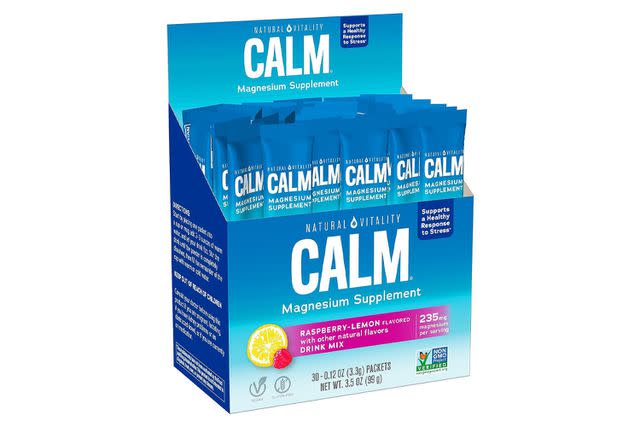
Amazon
What we like: Single-serving packets make it easy to take on the go.
What to know: At $1 per serving, these are more expensive than other supplements.
You may have noticed tubs of Natural Vitality’s Calm magnesium powders in grocery stores and drugstores. It’s a popular choice because it mixes easily into water, comes in several tasty flavors and adds fun fizz similar to drinking your favorite seltzer. The same magnesium citrate powder is also available in single-serve packets that take up little space in a purse, backpack or suitcase.
Whether you’re traveling to the office or on your next big adventure, these little packets are easier to pack than bottles of capsules or tubs of powders. Each box contains 30 packets and each packet provides you with 235 milligrams of magnesium. Calm products are naturally flavored with stevia, a plant-based sweetener and are non-GMO verified.
Price: $24 | Type of magnesium: Citrate | Form: Powder | Magnesium per serving: 235 milligrams (56% DV) | Third-party tested: No
Best for Cognitive Support: Pure Encapsulations CogniMag
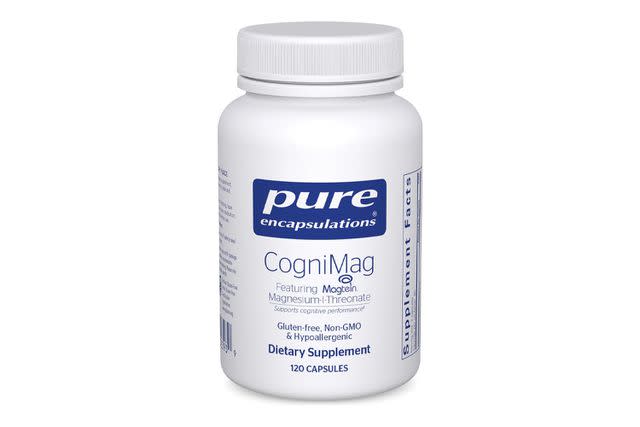
Amazon
What we like: Formulated with magnesium-l-threonate, a type of magnesium linked to brain and neurological benefits.
What to know: Pricier than other magnesium threonate supplements, but a bottle contains 60 servings versus others that contain a one-month supply.
The brain and nervous system rely on adequate magnesium to function optimally. If you’re looking for a magnesium supplement to support cognition, research suggests choosing one that includes magnesium threonate. A 2019 animal study found this type of magnesium increases magnesium levels in the brain more than other types.
Pure Encapsulations CogniMag pairs magnesium threonate with PhytoMemory, a proprietary blend of fruit and vegetable polyphenols from wild blueberries, strawberries and spinach. Research has shown both magnesium and plant polyphenols can help support brain health, as well as cognitive functions like learning and memory.
Each bottle contains a two-month supply of capsules. Each serving has 72 milligrams of magnesium, which is the least of any magnesium supplement on this list.
Price: $86 | Type of magnesium: Threonate | Form: Capsules | Magnesium per serving: 72 milligrams (17%) | Third-party tested: Yes
Best for Constipation: NOW Magnesium Oxide Pure Powder
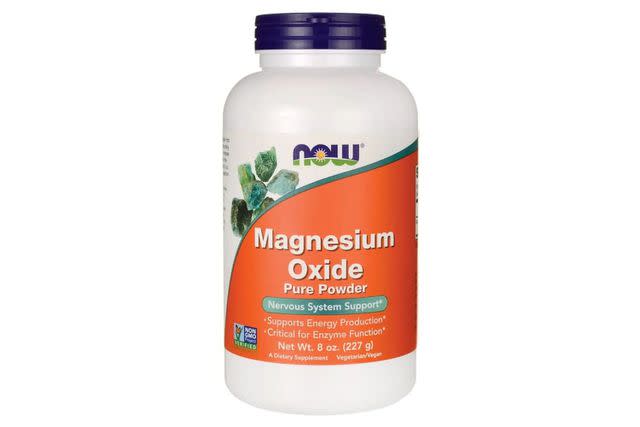
Walmart
What we like: Contains only one ingredient: powdered magnesium oxide.
What to know: This form of magnesium isn’t ideal for raising your body’s dietary magnesium levels.
Studies have found magnesium oxide is the most poorly absorbed form of supplemental magnesium. While we don’t recommend it for boosting magnesium levels, it’s a good choice for dealing with occasional constipation because it moves through your system (i.e. isn’t absorbed). Some people even report relief from heartburn with this type of magnesium.
NOW Magnesium Oxide Pure Powder is exactly what it sounds like—powdered magnesium oxide with no other ingredients. Each serving of this powder contains 290 milligrams of magnesium, which is on the higher end but still within the recommended amount. Each bottle contains a whopping 454 servings, so you can expect this to last for quite some time. This product is non-GMO, vegan and certified for safety standards by the third-party Underwriters Laboratories (UL).
Price: $10 | Type of magnesium: Oxide | Form: Powder | Magnesium per serving: 290 milligrams (69% DV) | Third-party tested: Yes
The Bottom Line: The Best Magnesium Supplements
Pure Encapsulations Magnesium Glycinate (view at Amazon) earns our top spot because it contains an easy to absorb form of magnesium that most people tolerate without side effects. It’s also free of allergens, is affordable and backed by third-party testing. If you’re not a fan of swallowing pills, check out Thorne Magnesium Bisglycinate (view at Amazon). It contains a highly absorbable form of powdered magnesium that can be mixed into a glass of water and is NSF Certified for Sport.
Choosing a Magnesium Supplement
There are several things to consider before settling on the right magnesium supplement for your needs. Here’s what to keep in mind while shopping.
Consider the type of magnesium and its intended use
The first thing to take note of is the type of magnesium a magnesium supplement contains. You can find this information on the Supplement Facts label.
Supplemental magnesium comes in several types, called magnesium salts. Some types of magnesium are better suited for certain uses, so choosing the right type of magnesium for your needs is essential to get the benefits you’re looking for. Also, some types of magnesium are better absorbed than others, which may make some supplements more effective than others.
Here are some of the forms of magnesium you may find in oral supplements:
Magnesium citrate: good for general wellness and constipation relief. It is absorbed well in the body and may have a calming effect for some.
Magnesium chloride: one of the more easily absorbed forms of magnesium and good for general wellness.
Magnesium glycinate: also good for overall health and improving magnesium levels.
Magnesium lactate: another of the better-absorbed forms of magnesium and good for boosting magnesium levels.
Magnesium malate: helpful for general wellness and improving magnesium levels in the body.
Magnesium oxide: ideal for constipation relief because it's not absorbed well.
Magnesium sulfate: also helpful for constipation.
Magnesium threonate: associated with brain and neurological benefits.
Magnesium supplements can contain one or more types of magnesium. For full body support, look for a magnesium supplement that contains a well-absorbed form of magnesium or a blend of several types of magnesium.
Some magnesium supplements combine magnesium with other ingredients to benefit specific concerns, like constipation or leg cramps, so always double check the Supplement Facts label.
Form of the supplement
Magnesium supplements are available as capsules, chewable tablets, gummies, powders and liquids. Magnesium powders are typically absorbed faster than capsules, which may be important if you’re using magnesium to help you fall asleep or relieve a headache.
The best supplement form for you depends on your personal preferences and lifestyle. For example, if you don’t like swallowing pills, a powder or drinkable supplement may be preferable.
Look for third-party testing
It’s a good idea to choose supplements from brands who undergo third-party testing, since dietary supplements are not regulated by the Food and Drug Administration.
Third-party testing is a voluntary, out-of-pocket expense for manufacturers of dietary supplements, but it helps ensure the purity, safety and quality of a product. Third-party testing guarantees that a supplement contains the ingredients it says it does and does not contain harmful levels of contaminants.
If third-party testing is a must-have for you, look for a magnesium supplement that has been third-party tested by a recognizable company, such as ConsumerLab, NSF International, UL or USP. Products that have been verified by one of these testing companies will typically be labeled with an official seal on the packaging.
Ingredients
It’s always a good idea to read the ingredient list before purchasing a supplement. Many individuals have dietary preferences and/or restrictions and the ingredient list will inform you whether a supplement is made with ingredients that are appropriate for your needs.
You should know that some forms of magnesium supplements, particularly gummies, powders and liquids, can contain added sugar. If you prefer keeping added sugar intake to a minimum, you’ll likely want to avoid gummy supplements and double check the Supplement Facts label for how much added sugar is in each serving of a supplement.
Some supplements also contain thickeners, preservatives, coloring and/or flavoring. Colors and flavors added to supplements can be artificial or natural, so again, always double-check the ingredients label to make sure a product fits your dietary preferences.
If you have food sensitivities or allergies, other ingredients to watch for are gluten, soy and other major food allergens. The ingredient list will disclose the presence of any allergens or potential cross-contamination from manufacturing.
If you’re plant-based, you’ll want to look for a vegetarian or vegan supplement. Likewise, if you prefer to shop organic or non-GMO (genetically modified organisms), you’ll want to look for a magnesium supplement that bears a certified organic seal and/or Project Non-GMO verified.
Our Search for the Best Magnesium Supplements
As you can imagine, there are a lot of magnesium supplements to choose from. To narrow down our list of recommendations, we started by focusing on ingredients, dosage and brand reputation. We looked for products formulated with bioavailable forms of magnesium in doses that fall within the Recommended Dietary Allowance and under the Tolerable Upper Intake Level set for magnesium. When deciding between two options, we gave the edge to brands that are committed to quality ingredients and third-party testing.
We also considered several supplement forms, including capsules, powders and chewables. Finally, we interviewed registered dietitians for their best advice on taking magnesium and their go-to magnesium supplement picks.
We Also Considered
Garden of Life Magnesium Gummies with Pre & Probiotics ($15 at Amazon): If you’re a fan of gummy supplements, this is a great choice. Unlike many gummy supplements, these contain zero grams of added sugar. Each gummy contains 100 milligrams of magnesium citrate (24% DV) and 250 million CFU of probiotics to support digestive health. This product is also certified vegan, Non-GMO Project Verified and bears a third-party testing seal from NSF.
Nature Made Magnesium Complex with D3 and Zinc ($17 at Amazon): This capsule supplement contains four well-known forms of magnesium: citrate, glycinate, malate and oxide, making it a good choice to support full body wellness. Each serving contains 230 milligrams of magnesium (55% DV), as well as Vitamin D3 and Zinc to support the immune system. If you already take other supplements that contain D3 and/or zinc, this may be redundant. Nature Made is an affordable and trusted brand. While many of their products bear the NSF testing seal, their line of magnesium supplements do not.
Common Questions
Should you take a magnesium supplement every day?
“It depends,” says Koff. “Your body does store magnesium, so you could take it every few days and some days rely on just food. But if you are experiencing symptoms of insufficiency, then you would want to take it daily to address those.”
Having your magnesium levels checked by a doctor can help you determine the best path forward. For most intended uses, magnesium supplements can be used daily. Using a supplement consistently typically provides the best results. However, it’s important not to take more magnesium than is directed.
If you’re taking a magnesium supplement to improve regularity, you might not need to take it every day if you start having daily bowel movements. The same goes for headaches and sore muscles: perhaps you want to take magnesium when you feel an occasional headache coming on or only on days you work out to support exercise recovery.
If you experience side effects from taking magnesium, such as an upset stomach or diarrhea, you may want to cut back on how often you’re taking magnesium. A healthcare provider can assist you in determining how much magnesium to take and when to take it.
When is the best time of day to take a magnesium supplement?
The time of day you take a magnesium supplement may depend on the reason you’re taking it. For example, if you’re taking magnesium to help you relax and get a better night’s sleep, you’ll want to take your supplement an hour or two before bedtime.
Other than for enhancing sleep, you can take a magnesium supplement at any time of day that works best for you. Sometimes pairing a supplement with a daily habit, like brewing a pot of coffee or brushing your teeth, can help you remember to take it.
“The most important part of taking a magnesium supplement is that it’s done consistently,” says Panoff. “Whether you take it morning, afternoon, or evening, establishing a routine will have the most long-term benefit.”
What are the benefits of magnesium supplements?
Magnesium supplements can support gaps in dietary intake. “The best place to get any micronutrient, including magnesium, is through whole food sources,” says Panoff. “If you’re unable to meet your needs through diet alone, a magnesium supplement can help.”
Magnesium supplements can support full body wellness, including the health of your heart, brain, muscles and bones. Some studies have also found magnesium supplements can relieve constipation, enhance sleep quality, boost mood and promote muscle relaxation, which can help ease everyday tension, workout soreness and even uncomfortable menstrual cramping.
How much magnesium is safe to take?
“Stick with the Recommended Dietary Allowance (RDA) or lower unless you’ve been otherwise directed by your healthcare provider,” says Panoff. The RDA for adults is as follows:
Women 19 to 30 years old: 310 milligrams per day
Women 31 years and older: 320 milligrams per day
Men 19 to 30 years old: 400 milligrams per day
Men 31 years and older: 420 milligrams per day
Pregnancy & lactation: 310-400 milligrams per day
The U.S. Food and Drug Administration (FDA) sets Daily Values (DV) so consumers can compare the nutrient contents of foods and dietary supplements within the context of a total diet. The DV for magnesium is 420 milligrams per day for adults and kids over the age of 4 years.
The Institute of Medicine has set a Tolerable Upper Intake Level for magnesium supplements. This amount is the maximum intake of a nutrient that is unlikely to cause adverse effects. The Tolerable Upper Limit only applies to magnesium you take from supplements, not the magnesium found in foods. For magnesium, the upper limit has been set at 350 milligrams per day for all individuals over 9 years of age.
Based on the above information, supplements that deliver 100 to 350 milligrams of magnesium is a good starting point. When choosing a dosage, you should also consider whether any other supplements you take contain magnesium. Taking multiple magnesium-containing supplements could put you above the Tolerable Upper Intake Level.
What are the side effects of magnesium supplements?
When taken as directed, magnesium supplements shouldn’t present serious problems for most individuals. However, if you’re getting too much magnesium from supplements, you may experience side effects—the most common being stomach cramps, nausea and/or diarrhea.
If you’ve experienced digestive upset after taking magnesium, you may want to pair your supplement with a meal or snack. Taking magnesium with food can help minimize digestive upset.
Who should not take a magnesium supplement?
While magnesium supplements are generally safe for most healthy adults, there are some instances where taking them may be contraindicated.
Magnesium supplements may not be appropriate for individuals diagnosed with diabetes, heart disease, digestive disorders and/or kidney disease. A healthcare provider can determine if a magnesium supplement is safe and appropriate for you.
Magnesium can interfere with some prescription medications, including antibiotics and some medications for the heart. If you’re currently prescribed medicine, it’s best to consult your healthcare provider before adding a magnesium supplement to the mix.
Our Trusted Expertise
Sharon Lehman, RD, is a content creator, seasoned recipe developer and avid home cook. She’s been writing about food, nutrition and health for over six years. To write this article, Lehman interviewed two additional dietitians:
Ashley Koff, RD, founder of The Better Nutrition Program
Lauren Panoff, M.P.H., RD, a plant-based lifestyle expert
This article was edited by Brierley Horton, M.S., RD, a senior commerce editor with over 15 years of experience writing about nutrition, health and food.
Read the original article on Eating Well.

